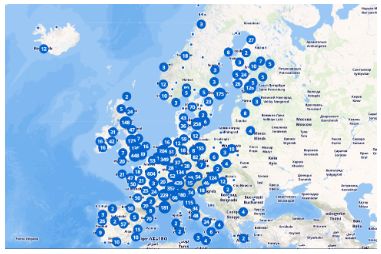- with readers working within the Pharmaceuticals & BioTech industries
The UK Government has published results of an independent review of university spin-out companies, reporting that UK university spin-out investment has increase five-fold from £1.06 billion in 2014 to £5.3 billion in 2021. We summarise this report and also give advance notice of an initiative on European university spin-outs coming from the European Patent Office (EPO) next year.
Independent Report for the UK Government
The UK is home to four of the world's top ten universities, and although just over 29% of active spin-outs have originated from those four institutions, a total of 45% of spin-outs have originated from the top 10 UK academic institutions collectively. A further 52 institutions are active in spinning out companies and together they account for the other 55%. The review is commissioned by the UK Government and this summary draws from an earlier report by Beauhurst, which is a searchable database of high-growth companies in the UK.1
The review provides an independent report with 11 recommendations to help improve the creation and growth of university spin-outs. The Government has published a response, which is to accept the recommendations of the report.
The 'golden triangle' of Oxford, Cambridge and London attracts a high percentage of UK spin-out investment - about £3.94 billion in 2021/22, or 74.5% of investment in spin-outs. Scotland also performs well, receiving 17% of investment.
Deal terms and time to closing
Notable from the report is that deal terms offered by a growing number of UK universities have been moving towards – and are now comparable to – those taken in leading US institutions. Many of the top UK universities are doing most deals at 5-15% equity (higher for life sciences and lower for less IP-intensive sectors such as software-only spin-outs at 10% or less), with hardware and engineering spin-outs sitting somewhere between software and life sciences. The report notes that some universities begin negotiations rather high and take longer to conclude deals, and its first recommendation is for universities to adopt, publish and adhere to transparent policies that draw from experiences set out in the report to help close this gap earlier in the process.
Fewer founders (39%) thought their deals with their universities were balanced and fair than those (43%) who did not. A majority (55%) believed their deals with investors were balanced and fair.
Sometimes the negotiations can take an unnecessarily long time, which is partly why some universities have adopted a standardised set of express deal terms to speed up the process. The report approves this practice and sets out what the authors consider to be terms that are fair. The University of Sheffield is given as an example that has abandoned previous practice of starting equity negotiations at 50-60%, and now take 5-20%, with the exact amount determined case-by-case.
Currently only around half of Russell Group universities publish their licensing policies. Summaries and links to these policies can be found in the Beauhurst report, and readers who are considering working with these universities should make note of these.
Most spin-outs take 4-12 months from the point at which the academic founder and Technology Transfer Office (TTO) agree to spin-out to completing all necessary processes to having all agreements and paperwork complete to establish the company. The time taken to spin out depends on various factors, and experienced advisors play a role. Patent due diligence is listed as one of the important steps. Investors or lawyers with little or no experience of working on spin-outs sometimes cause unnecessary delays.
From a university point of view, spinouts are not such a high source of revenue as licensing deals. Indeed, universities can often lose money on spin-outs. In 2021/22, UK universities made £244 million from licensing intellectual property, and only £86 million from sales in shares. Collectively, this income represents just 2.1% of research expenditure but the proportions are higher for the half dozen universities at the top of the rankings. The report does not speculate whether the share-sale proportion may rise as companies in the growing pipeline achieve successful exits.
Public Funding for Spin-outs
On funding, the report says the Government provides funding for technology transfer through Research England's (RE's) Higher Education Innovation Fund (HEIF). In the academic year 2022-23, HEIF was £260m across England. The Government response to the report says the figure is £280m in the current spending period.
The report described the role of the British Business Bank (BBB) as important, with particular emphasis on the North and the regions of England. BBB funds are often matched with private funds. Numbers from the Beauhurst report put the BBB at about 6th largest source of spin-out funding when compared with private funds.
IP Ownership and "Professors' Privilege"
The report is negative about so-called "Professor's privilege", which is a term to describe policies that allow academics to own their own IP. Under a Professor's privilege regime, academic founders have freedom to operate independently of the university, and this can remove, and also lose important benefits offered by the university. Professor's privilege can slow down industrial collaborations. It can also lead to disagreements between multiple inventors voiding IP if the right processes are not followed to secure the IP. Professor's privilege can lead to disagreements between multiple inventors, voiding IP if the right processes are not followed to secure the IP.
For such policies to be successful, much time and effort is required to educate academics to drive commercialisation of their ideas. This type of arrangement can work when the right culture and support systems are in place.
With notable exceptions in Sweden and Canada, most nations and universities operate a system of university IP ownership. This is the predominant model in the UK and has been in many UK universities for nearly 20 years. The overwhelming thrust of the report is that it works well for all parties concerned and particularly for UK PLC.
About the Review
The UK Government review was led by Prof. Irene Tracey CBE, Vice-Chancellor of the University of Oxford and member of the Medical Research Council (MRC) and Dr. Andrew Williamson, Managing Partner of Cambridge Innovation Capital and Chair of the Venture Capital Committee at the British Private Equity and Venture Capital Association (BVCA). The review reported jointly to the Chancellor of the Exchequer and Secretary of State for Science, Innovation and Technology. The review ran from March to October 2023.
EPO Initiatives
The EPO has established what it calls an "Observatory on Patents and Technology", which seeks to leverage the office's vast sources of data to add to public awareness of topics suggested by stakeholders and innovation experts.
So far, some of the output of the Observatory is a little underwhelming. A report produced in October 2023 entitled "Patents, trade marks and startup finance - Funding and exit performance of European startups" is rendered almost meaningless by lumping patents and trademarks together. The report says the link between IP rights and company performance is clear, but at the granular level, it finds that only 10% of start-ups have patent rights at seed stage, rising to 28% at early stage and 48% at late stage. We strongly suspect this fails to take into account that seed stage patent filings are often filed in some name other than the ultimate name given to the start-up company. The methodology of the report does not address this question, which casts doubt on the findings. As for trade marks, 72% of start-ups have trade marks rights registered at least at the national level. Of the companies that register their rights, large proportions make use of the EPO and EUIPO routes, but it is far-fetched and self-serving to draw any clear conclusions.
As part of the ongoing tasks under the Observatory, the EPO has also introduced, for a start, a few accessible, and user-friendly dashboards that keep the public up to date on the vast amount of patent intelligence gathered by the EPO through patent filings at the office. The dashboards are designed to present the patent intelligence, cross-referenced with economic data curated by other organisations, from which rich and meaningful insights into innovation in particular sectors, countries or regions may be obtained.
One of the newly introduced dashboards is the Deep Tech Finder2, where the EPO has incorporated data from the Dealroom, a global provider of data and intelligence on startups seeking funding, with the information on their respective patent portfolios as visible through the EPO's public patent database, Espacenet. At present, the Deep Tech Finder appears to cover a list of 7888 startups in Europe that have filed patent applications with the EPO. Many of those listed startups seem to be located in the UK, France, Germany, Netherlands, Switzerland, and Italy, which broadly correlate with those EPC states with top European patent filing volume.
Through the dashboard, users may search for startups of interest from the list, based on criteria such as country, growth stage, industry, startup name, investor name, etc. The dashboard then provides information about each startup, what funding they already have, as well as the status of their patent application(s), which is conveniently accessible via Espacenet. For example, searching under BBB as the investor name uncovered 11 startups from the list funded by BBB. The dashboard may thus also be used as a tool to scout for potential business partnership.

We think the usefulness of the dashboard could be enhanced by making the results available in a downloadable format. In the current form, the user may add the startups from the search results to a temporary holding list created for the session, but there is no option to permanently record those results, should he wish to revisit them at a later time. While the Deep Tech Finder is a work-in-progress, it represents an encouraging first step by the EPO to provide an accessible data tool that may allow monitoring of emerging innovation trends and their economic potential.
The Observatory roadmap for 2024 plans for a comprehensive report in the second half of 2024 on the commercialisation of patents by universities in Europe, and also a dashboard of patent filings by those universities. The EPO informs that the focus of the report is on reporting and shedding light on patented inventions originating from the universities, and measuring the impact of commercialising university inventions, as well as their impact on the local innovation ecosystems.
When juxtaposed with the above findings in the review of university spin-out companies in the UK, the planned report may provide interesting insights into the patent filing and related commercialisation activities undertaken by the other European universities. We will bring you more information on this as it becomes available.
Emerging technologies
The EPO Deep Tech dashboard allows searching of companies by technology sector. There are 41 such sectors alphabetically from Chemicals to Wellness. Most are fairly traditional, with some interesting newcomers such as Dating (yes, one start-up company even has a granted patent in that sector). The Beauhurst report of UK spin-outs has a second breakdown of "emerging sectors", top of which are artificial intelligence, and genomics. Precision medicine, e-health and big data are also in the top five. These sectors in particular are attracting investment. Some of these sectors may span across the more traditional sectors. AI in particular is already impacting almost every sector of industry and commerce.
The EPO may consider supplementing its dashboard and/or classification of technologies using an emerging technologies classification. The office has already done this for climate change mitigating technologies, and this is a useful search tool.
One of the recommendations of the UK Government review is for a database of spin-outs. This initiative from the EPO could well provide core data to fill that gap. Tools such as these aid in transparency and can help drive investment and commercialisation of university-originating inventive ideas that lie at the cutting edge of technology.
Investors should, of course, continue to do their due diligence. We have plugged in a few client names and investors into the Deep Tech dashboard and found missing or misleading results. It is far from comprehensive, but it is a promising step in an interesting direction.
Footnotes
1 Beauhurst-Spotlight-on-Spinouts-2023.pdf.
The content of this article is intended to provide a general guide to the subject matter. Specialist advice should be sought about your specific circumstances.


